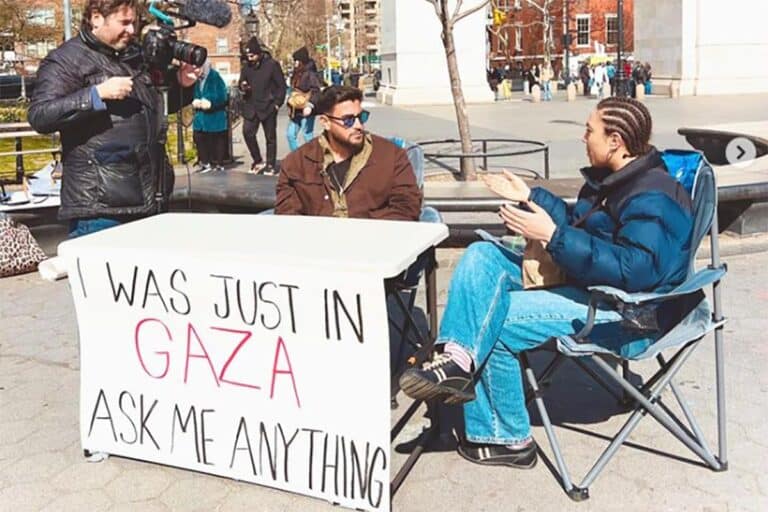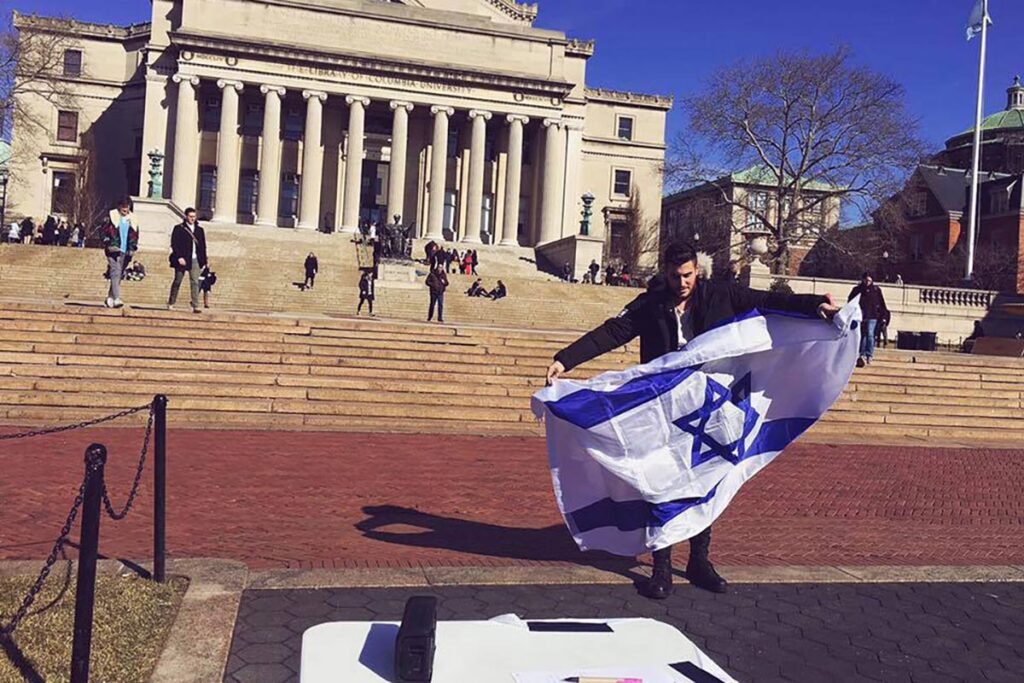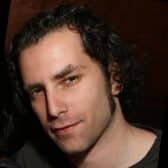
Few people can say they have fought Hamas on the battlefield and debated anti-Israel protesters at Columbia University.
Rudy Rochman, 30, has done both. The IDF reservist, who is on a speaking tour in America, is also a content creator with over 200,000 followers on Instagram. Since Oct. 7, he has made many videos and appeared on major news channels speaking about why Israel was forced into a war it did not want.
On Oct. 7, Rochman was with family, preparing to attend a relative’s wedding, when his mother showed him the horrific images of Hamas’s attack. After seeing the photos of terrorists in pickup trucks riding freely in Sderot and young partygoers running from bullets at the Nova festival, he went to Jerusalem to get his military gear and fought Hamas for two and a half days.
“The feeling I had was not fear,” Rochman told Unpacked of going into combat. “It was the pain of the realization that we were not able to prevent this from taking place. None of us were prepared to see a massacre of civilians. You can’t prepare for that.”
Unpacked caught up with Rochman to discuss the encampments, why he believes change must come from the bottom up, and the importance of confronting challenges with hope rather than fear.
The two facets of the Israel-Hamas War: Physical and ideological
For Rochman, the conflict shifted from fighting in a physical war to an ideological one.
“Hamas knows it can’t win a physical war so it’s trying to win an ideological war,” Rochman said. He argued that Hamas anticipated Israel’s response and the Palestinian civilian casualties that would result.
“Their goal is to get the world to turn on Israel and to use words like ‘apartheid,’ ‘genocide,’ ‘ethnic cleansing’ and ‘colonizer’ to depict Israel as the aggressor and oppressor.”
Rochman said that Palestinian suffering is real and tragic, acknowledging that many civilians have died in the war. He said the strategy against Israel is effective because many do not think critically.
“The biggest lie is that the protestors are pro-Palestinian,” Rochman said. “When thousands of Palestinians die in the Syrian Civil War, nobody talks about it. When hundreds of thousands of Palestinians are in refugee camps in Lebanon and Jordan — or when Palestinians suffer under Hamas or the Palestinian authority — they don’t mention it.”
“The only talk of Palestinian suffering is when it has to do with Israel. It’s taken out of context as if Israel is the source of problems of everything in the world. That’s how antisemitism works. You find a source of suffering and you attach that to the Jewish people and Israel,” he added.
“Freedom of reaction to speech”
In this interview from November 2023, Rochman said that misinformation has been spreading on college campuses for 25 years.
There has been “a manipulation of information both by student groups and professors and administration convincing the next generation’s future political and intellectual class — because that’s what university students represent — that the source of all problems is the Jews,” he said.
He emphasized that there are rights not only to free speech but also to reaction to speech.
“If someone were to express racist views in an intellectual space like a university today — saying that Black people are not or should not be equal to white people, or spreading xenophobia against any minority — that person might get kicked out of school, and finding employment could become challenging.”
“I’m surprised it took this long for the Columbia encampment to happen”
Rochman was a student at UCLA but decided to transfer to Columbia University after seeing an article that listed Columbia as the most antisemitic university in North America based on specific incidents that took place.
He wanted to support the Jewish community there and founded the Columbia chapter of Students Supporting Israel, a pro-Israel campus movement based in the U.S. and Canada.

Rochman said he was “surprised it took this long” for the encampment to happen at Columbia, noting that on his first day at Columbia, he was called a “colonizer” and a “racist.”
He said that pro-Palestine students at the school have long “been investing in shifting the pop culture and making sure the world sees Israel as the source of all problems in the world.”
Rochman said his “biggest frustration” at Columbia “was not how strong the anti-Israel movement was but how weak and non-existent the Israel movement was.”
“When we say, ‘Never Again,’ it’s not that we can somehow say these words and it’s a magical spell because we say it once or twice a year. There needs to be a commitment to make sure it doesn’t happen again.”
He said that by engaging in dialogue with anti-Israel students, he was able to reduce some of the antisemitic sentiments at the school, which also led to a decrease in the number of anti-Israel events on campus.
“Change must come from the bottom up”
He told i24 News that change “is not going to come from the top down [but must come] from the bottom up.” He expressed his belief that politicians and school administrators will support whatever the majority of students believe, irrespective of their personal views.
“If we’d like to see change, it has to come from the students,” he said.
Rochman also critiqued the approach of having university presidents testify before Congress, likening it to “putting a band-aid on a wound that needs surgery.”
He stressed the importance of changing the underlying culture among students to prevent the perpetuation of problematic ideas.
“You can’t look at it from the top down. You have to look at it from the bottom up. You have to shift the pop culture, because if we don’t, the next generation of university presidents and leaders in Congress will continue to harbor the same problematic ideas,” Rochman argued, adding that simply calling for resignations isn’t the solution.
Rochman said he would like to see more work with Jewish college students at the grassroots level to cultivate this change from the ground up.
How antisemitism differs from other forms of racism
It is estimated that there are about 15 million Jews in the world, making up about .2% of the world’s population of 8 billion people. So why is there such a focus on Jews?
“Antisemitism is not a normal type of xenophobia,” Rochman said. “For racism, it’s usually extremist white people who hate Black people. For sexism, it’s usually extremist men who hate women.”
“For Jews, it’s many groups who hate the Jews. The far-right think we’re the left. The far-left think we’re the right. The capitalists blamed us for communism. The communists blamed us for capitalism. The white supremacists blame us for the problems of the world. The Black supremacists blame us for the problems of the world. Covid was blamed on the Jews. Society will always find a way to blame the Jewish people,” he said.
The importance of displaying Jewish pride
In the aftermath of Oct. 7, some have chosen to hide their Jewish identity, while others have continued or begun to openly embrace it. Rochman strongly believes in the importance of displaying Jewish pride.
“We should be afraid of what happens when we remove the Magen David; we should not be afraid of wearing it,” Rochman said. “The only thing Jews should be afraid of is Jews being afraid.”
“The moment we divide ourselves, that we put our heads down, those are the starts of the worst chapters in Jewish history with antisemitism skyrocketing. The moment when we unite is when we overcome all enormous challenges that have been placed against us.”
The role of education in combatting misinformation
In his interview with Unpacked, Rochman stressed the importance of education in combatting misinformation, both within and outside the Jewish community.
He has actively demonstrated this through his visits to various university campuses. For instance, shortly after this interview, during a visit to George Washington University, he had a discussion with a Jewish anti-Israel protestor and was harangued by taunts and insults:
Since Oct. 7, Rochman has shared numerous videos of himself engaging in dialogue with others about the Israel-Hamas War. In these videos, he remains calm and sticks to facts, and many appear befuddled by his knowledge and unthreatening demeanor.
Rochman said that many individuals have reconsidered their views after speaking with him, underscoring how he is using education as a tool against misinformation.
He highlighted how a social media campaign has turned the word “Zionist” into a slur, and emphasized the importance of understanding that the word simply refers to the Jewish right to self-determination in the land of Israel.
Rochman’s message to the Jewish community at this time is to focus on what is within our control and to approach challenges with hope rather than fear. “We have to have hope and we can never bury our heads in the sand,” he said.
